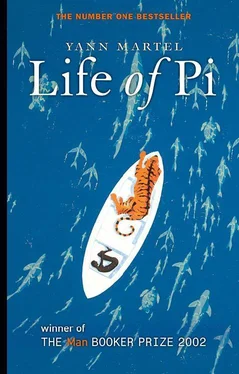“ Just give him another one. We have to humour him.We’ll be back in a few minutes.”
Mr. Okamoto: “Mr. Patel, we don’t believe your story.”
“Sorry—these cookies are good but they tend to crumble. I’m amazed. Why not?”
“It doesn’t hold up.”
“What do you mean?”
“Bananas don’t float.”
“I’m sorry?”
“You said the orang-utan came floating on an island of bananas.”
“That’s right.”
“Bananas don’t float.”
“Yes, they do.”
“They’re too heavy.”
“No, they’re not. Here, try for yourself. I have two bananas right here.”
Mr. Chiba: “Where did those come from? What else does he have under his bedsheet?”
Mr. Okamoto: “ Damn it.No, that’s all right.”
“There’s a sink over there.”
“That’s fine.”
“I insist. Fill that sink with water, drop these bananas in, and we’ll see who’s right.”
“We’d like to move on.”
“I absolutely insist.”
[Silence]
Mr. Chiba: “What do we do?”
Mr. Okamoto: “I feel this is going to be another very long day.”
[Sound of a chair being pushed back. Distant sound of water gushing out of a tap]
Pi Patel: “What’s happening? I can’t see from here.”
Mr. Okamoto [distantly]: “I’m filling the sink.”
“Have you put the bananas in yet?”
[Distantly] “No.”
“And now?”
[Distantly] “They’re in.”
“And?”
[Silence]
Mr. Chiba: “Are they floating?”
[Distantly] “They’re floating.”
“So, are they floating?”
[Distantly] “They’re floating.”
“What did I tell you?”
Mr. Okamoto: “Yes, yes. But it would take a lot of bananas to hold up an orang-utan.”
“It did. There was close to a ton. It still makes me sick when I think of all those bananas floating away and going to waste when they were mine for the picking.”
“It’s a pity. Now, about—”
“Could I have my bananas back, please?”
Mr. Chiba: “I’ll get them.”
[Sound of a chair being pushed back]
[Distantly] “Look at that. They really do float.”
Mr. Okamoto: “What about this algae island you say you came upon?”
Mr. Chiba: “Here are your bananas.”
Pi Patel: “Thank you. Yes?”
“I’m sorry to say it so bluntly, we don’t mean to hurt your feelings, but you don’t really expect us to believe you, do you? Carnivorous trees? A fish-eating algae that produces fresh water? Tree-dwelling aquatic rodents? These things don’t exist.”
“Only because you’ve never seen them.”
“That’s right. We believe what we see.”
“So did Columbus. What do you do when you’re in the dark?”
“Your island is botanically impossible.”
“Said the fly just before landing in the Venus flytrap.”
“Why has no one else come upon it?”
“It’s a big ocean crossed by busy ships. I went slowly, observing much.”
“No scientist would believe you.”
“These would be the same who dismissed Copernicus and Darwin. Have scientists finished coming upon new plants? In the Amazon basin, for example?”
“Not plants that contradict the laws of nature.”
“Which you know through and through?”
“Well enough to know the possible from the impossible.”
Mr. Chiba: “I have an uncle who knows a lot about botany. He lives in the country near Hita-Gun. He’s a bonsai master.”
Pi Patel: “A what?”
“A bonsai master. You know, bonsai are little trees.”
“You mean shrubs.”
“No, I mean trees. Bonsai are little trees. They are less than two feet tall. You can carry them in your arms. They can be very old. My uncle has one that is over three hundred years old.”
“Three-hundred-year-old trees that are two feet tall that you can carry in your arms?”
“Yes. They’re very delicate. They need a lot of attention.”
“Whoever heard of such trees? They’re botanically impossible.”
“But I assure you they exist, Mr. Patel. My uncle—”
“I believe what I see.”
Mr. Okamoto: “Just a moment, please. Atsuro, with all due respect for your uncle who lives in the country near Hita-Gun, we’re not here to talk idly about botany.”
“I’m just trying to help.”
“Do your uncle’s bonsai eat meat?”
“I don’t think so.”
“Have you ever been bitten by one of his bonsai?”
“No.”
“In that case, your uncle’s bonsai are not helping us.Where were we?”
Pi Patel: “With the tall, full-sized trees firmly rooted to the ground I was telling you about.”
“Let us put them aside for now.”
“It might be hard. I never tried pulling them out and carrying them.”
“You’re a funny man, Mr. Patel. Ha! Ha! Ha!”
Pi Patel: “Ha! Ha! Ha!”
Mr. Chiba: “Ha! Ha! Ha! It wasn’t that funny.”
Mr. Okamoto: “Just keep laughing.Ha! Ha! Ha!”
Mr. Chiba: “Ha! Ha! Ha!”
Mr. Okamoto: “Now about the tiger, we’re not sure about it either.”
“What do you mean?”
“We have difficulty believing it.”
“It’s an incredible story.”
“Precisely.”
“I don’t know how I survived.”
“Clearly it was a strain.”
“I’ll have another cookie.”
“There are none left.”
“What’s in that bag?”
“Nothing.”
“Can I see?”
Mr. Chiba: “There goes our lunch.”
Mr. Okamoto: “Getting back to the tiger …”
Pi Patel: “Terrible business. Delicious sandwiches.”
Mr. Okamoto: “Yes, they look good.”
Mr. Chiba: “I’m hungry.”
“Not a trace of it has been found. That’s a bit hard to believe, isn’t it? There are no tigers in the Americas. If there were a wild tiger out there, don’t you think the police would have heard about it by now?”
“I should tell you about the black panther that escaped from the Zurich Zoo in the middle of winter.”
“Mr. Patel, a tiger is an incredibly dangerous wild animal. How could you survive in a lifeboat with one? It’s—”
“What you don’t realize is that we are a strange and forbidding species to wild animals. We fill them with fear. They avoid us as much as possible. It took centuries to still the fear in some pliable animals— domestication it’s called—but most cannot get over their fear, and I doubt they ever will. When wild animals fight us, it is out of sheer desperation. They fight when they feel they have no other way out. It’s a very last resort.”
“ In a lifeboat? Come on, Mr. Patel, it’s just too hard to believe!”
“Hard to believe? What do you know about hard to believe? You want hard to believe? I’ll give you hard to believe. It’s a closely held secret among Indian zookeepers that in 1971 Bara the polar bear escaped from the Calcutta Zoo. She was never heard from again, not by police or hunters or poachers or anyone else. We suspect she’s living freely on the banks of the Hugli River. Beware if you go to Calcutta, my good sirs: if you have sushi on the breath you may pay a high price! If you took the city of Tokyo and turned it upside down and shook it, you’d be amazed at all the animals that would fall out: badgers, wolves, boa constrictors, Komodo dragons, crocodiles, ostriches, baboons, capybaras, wild boars, leopards, manatees, ruminants in untold numbers. There is no doubt in my mind that feral giraffes and feral hippos have been living in Tokyo for generations without being seen by a soul. You should compare one day the things that stick to the soles of your shoes as you walk down the street with what you see lying at the bottom of the cages in the Tokyo Zoo—then look up! And you expect to find a tiger in a Mexican jungle! It’s laughable, just plain laughable. Ha! Ha! Ha!”
Читать дальше












